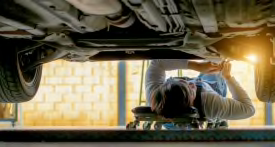Major Subprime Auto Lender Required to Repay Victims of Bad Loans
Credit Acceptance Corp. will pay $27 million to settle claims it levied hidden finance charges on consumers and charged usurious interest

Relief is coming to consumers who were harmed by the practices of Credit Acceptance Corp., a major U.S. subprime auto lender.
The company has been ordered to pay $27.2 million to settle claims it made loans to consumers in Massachusetts it knew could not afford to repay them, a state regulator announced Wednesday.
In a press conference, Massachusetts Attorney General Maura Healey called the settlement an “important recovery for consumers, one that will provide meaningful money, compensation, as well as debt relief, to thousands of people across Massachusetts.”
'Damaged My Credit Horribly'
For most Americans, a car is a day-to-day necessity for getting to work and to the doctor, and for other reasons. But for low-income and low-credit consumers, that pressing need is something predatory lenders exploit, Healey says.
In 2015, Massachusetts resident Jimoh Adeleke bought a car with financing from Credit Acceptance. Having a car was essential for him to get to his two jobs, he said during the state attorney general’s press conference.
He went with his wife to a dealership to buy a car, his first-ever vehicle purchase, and received financing through Credit Acceptance at an APR of 20.99 percent.
But after two years, in which he said he consistently made on-time payments, his wife became ill and required surgery. Adeleke says he fell behind on payments, and Credit Acceptance allegedly refused to work with him to catch up. Eventually, he defaulted on the loan.
Other borrowers who spoke at the press conference Wednesday said they were bombarded with calls from debt collectors after they fell behind on their loan payments.
“It damaged my credit horribly,” says Frank Mello, another Credit Acceptance customer, whose car was ultimately repossessed.
Industrywide Investigation
To maximize profits, the attorney general’s office alleged that Credit Acceptance created a “risk score” for each loan. The payment it made to dealers was based on this assessed score, with higher-risk loans resulting in lower payment to dealers.
But in cases where loans failed, Credit Acceptance also made money from the proceeds of cars that were repossessed and sold at auction.
On average, the company earned about $3,100 profit in each transaction, the lawsuit alleged, whether or not the borrower defaulted.
The deal with Credit Acceptance is one result of a yearslong investigation by Healey’s office into the auto lending industry, which remains ongoing. Her office has secured multiple settlements with various lenders in recent years for similar conduct and required lenders to change their lending practices.
CR’s Bell says auto lenders should be required to follow standards that ensure borrowers can repay their loans.
“Ability-to-repay standards are critically important for protecting low- and moderate-income borrowers, to avoid the harsh consequences of default, repossession and damaged credit,” Bell says. “If companies make overly expensive loans that they know borrowers can’t repay, they are just setting people up for failure.”
















